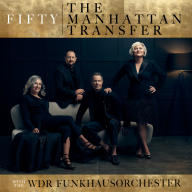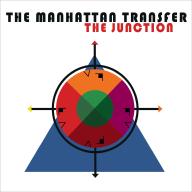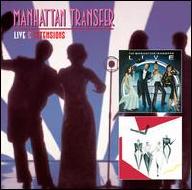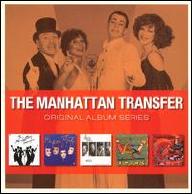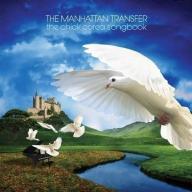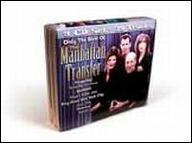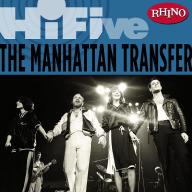Formed in 1969 in New York City, the Manhattan Transfer was initially somewhat of a hippie novelty act similar to the Lovin' Spoonful or Spanky Our Gang. At the time, the group included leaders Gene Pistilli and Tim Hauser, along with Erin Dickins, Marty Nelson, and Pat Rosalia. It was this line-up that recorded their 1971 debut, Jukin', which was more of a satire record than subsequent releases. It was also the last appearance by this Manhattan Transfer line-up who parted ways soon after the album's release.
By 1972, Hauser had re-formed the Manhattan Transfer, joining forces first with vocalists Laurel Masse and Janis Siegel, and finally adding singer Alan Paul. The group earned popularity with their appearances at various New York hot spots, before making their official recorded debut with 1975's eponymous The Manhattan Transfer. Recorded with help from the jazz world (including Zoot Sims, Randy Brecker, Jon Faddis, and Mel Davis), the album featured vocalese covers of iconic big band-era songs like "Java Jive" and "Tuxedo Junction," as well as a Top 40 hit in the gospel tune "Operator." The album peaked at 33 on the Billboard 200 and helped to revive interest in vocalese, a genre largely dormant since the mid-'60s. It also made the quartet stars in the global jazz community in the process.
The Manhattan Transfer's next two albums, Coming Out and Pastiche, found the group expanding their stylistic reach, cover songs from around the music community, from Nashville to Los Angeles to Motown. The albums also featured guest appearances by artists like Ringo Starr, Booker T. Jones, Dr. John, and others. A single from Coming Out, the ballad "Chanson d'Amour," hit number one in Britain and both albums charted on the Billboard 200.
Though Masse left in 1979 for a solo career, Cheryl Bentyne proved a capable replacement, and that same year, Extensions introduced their best-known song, "Birdland," an ode to bop written by Weather Report keyboardist Joe Zawinul several years earlier. Featuring lyrics by Jon Hendricks with a vocal arrangement by Bentyne, "Birdland" won the Grammy Awards for Best Vocal Arrangement for Two or More Voices and Best Jazz Fusion Performance.
Throughout the '80s, the group continued to embrace all aspects of American song. 1981's Mecca for Moderns hit number 22 on the Billboard 200 and earned the Manhattan Transfer their first American Top Ten hit, with a cover of the Ad Libs' 1965 girl group classic "The Boy from New York City," but also included a version of Charlie Parker's "Confirmation" and rendition of the romantic 1939 standard "A Nightingale Sang in Berkley Square." The album also earned the Manhattan Transfer honors as the first artist to receive Grammys in both the pop and jazz categories in the same year.
With 1985's Vocalese, a tribute to vocal pioneer Hendricks, the Manhattan Transfer shifted gears, focusing more on sophisticated vocal jazz arrangements and moving somewhat away from crossover pop. Still, they continued to explore a variety of themes, as on 1987's Brasil, foray into Bossa Nova and Brazilian traditions that took home the Grammy Award for Best Pop Performance by a Duo or Group with Vocals. They also delved further into original compositions, winning another Grammy for Bentyne, Seigel, and collaborator Bill Bodine's "Sassy" off 1991's The Offbeat Avenues. Other thematic albums including 1994's Tubby the Tuba (a children's record), 1995's Tonin' ('60s R&B), and 1997's Swing (pre-war swing), all of which reached to the top 10 of the jazz charts. The Manhattan Transfer capped off the decade with their 1998 induction into the Vocal Group Hall of Fame.
The group stayed very active and concept-heavy during the 2000s, beginning with a tribute to Louis Armstrong for 2000's The Spirit of St. Louis. They included a pair of Rufus Wainwright songs among the jazz material on 2004's Vibrate, and released An Acapella Christmas the following year. The Symphony Sessions followed in 2006, offering re-recordings of some of their best-known songs with orchestral arrangements. In 2009, the Transfer saluted one of the biggest names in jazz with The Chick Corea Songbook, and featured contributions from Corea, Airto Moreira, Christian McBride, and Ronnie Cuber, among others.
During the early 2010s, the group focused more on performing, although both Bentyne and Hauser were forced to find temporary replacements during medical procedures. After spinal surgery in 2013, Hauser returned to the group, but then died suddenly from cardiac arrest in October 2014. Following his death, vocalist Trist Curless of the a cappella group m-pact joined the group full-time. The group returned in 2018 with the eclectic studio album Junction, which they dedicated to Hauser. In 2022, Manhattan Transfer marked their 50th anniversary with Fifty, a collaboration with the Germany's WDR Funkhausorchester Köln. It found them revisiting many of their biggest hits with musical arrangements by Jorge Callandrelli and Vince Mendoza, and vocal arrangements by säje's Amanda Taylor. ~ Matt Collar, Rovi


